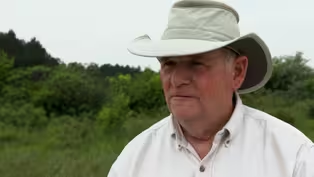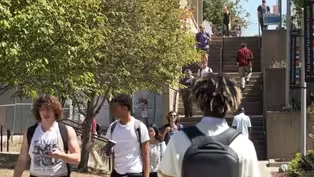
Founding Father's Role in Drafting Kentucky's Constitution
Clip: Season 3 Episode 259 | 5m 54sVideo has Closed Captions
Author Denis Fleming used firsthand accounts to piece together Kentucky's history.
Drawing on more than 40 years of legal expertise, Denis Fleming gives credence to a long-held belief that one of the nation's founding fathers authored or inspired part of Kentucky's constitution. He pieced together Thomas Jefferson's role in drafting the fundamental laws and principles of how Kentucky would be goverend.
Problems playing video? | Closed Captioning Feedback
Problems playing video? | Closed Captioning Feedback
Kentucky Edition is a local public television program presented by KET

Founding Father's Role in Drafting Kentucky's Constitution
Clip: Season 3 Episode 259 | 5m 54sVideo has Closed Captions
Drawing on more than 40 years of legal expertise, Denis Fleming gives credence to a long-held belief that one of the nation's founding fathers authored or inspired part of Kentucky's constitution. He pieced together Thomas Jefferson's role in drafting the fundamental laws and principles of how Kentucky would be goverend.
Problems playing video? | Closed Captioning Feedback
How to Watch Kentucky Edition
Kentucky Edition is available to stream on pbs.org and the free PBS App, available on iPhone, Apple TV, Android TV, Android smartphones, Amazon Fire TV, Amazon Fire Tablet, Roku, Samsung Smart TV, and Vizio.
Providing Support for PBS.org
Learn Moreabout PBS online sponsorshipDrawing on more than 40 years of legal expertise, Dennis Fleming gives credence to a long held belief that one of the nation's founding fathers authored or inspired part of Kentucky's constitution.
Using firsthand accounts from Thomas Jefferson and two of Kentucky's earliest leaders and Constitution, framers George Nicholas and John Breckenridge Fleming piece together Thomas Jefferson's role in drafting the fundamental laws and principles of how Kentucky would be governed.
Fleming talked with me recently about his new book called Thomas Jefferson and the Kentucky Constitution.
It's for our segment on books and authors that we call Turning the Page.
Well, George Nicholas was originally in the Virginia House of delegates.
He's an associate of Thomas Jefferson.
He was born in Williamsburg, Virginia.
His father had been in the House of delegates, and he was a lawyer.
He studied under George Wyeth, as did John Breckinridge and Thomas Jefferson.
He was the preeminent legal scholar of his day at the College of William and Mary.
He is the fellow that, as he studied under Jefferson when he was a member of the House of delegates with Jefferson, who was governor of Virginia, that began to learn Jefferson's thinking on constitutional constructs and what should be in a state and the federal constitution.
So I came across some letters where he's writing James Madison, who became a president, and Jefferson is writing Madison as well, complimenting Nicholas and saying, hey, Nicholas is going to go to Kentucky, and he's going to help them put together their constitution.
We had the hardest time developing our Constitution in Kentucky.
We started in 1784 with a series of conventions every year in Danville.
But when George Nicholas showed up and I found Nicholas in Breckenridge, Breckenridge is the father of the second Constitution in 1799, but they're both brilliant.
Breckinridge had more political ambition.
I think that Nicholas Nicholas thought he could make some money in Kentucky, and we know he wrote his younger brother.
You said Kentucky's beautiful.
You need to come see Lexington, see the land.
Daniel Danville.
You would love it.
But don't buy anything remotely or from somebody that you sin.
You've got to come see it first.
So he sort of reluctantly got back involved in politics.
And everybody in Kentucky knew he had work with Jefferson who was already known to be a big deal.
But what I ran across is the papers of Nicholas that are up at the University Chicago, and the Reuben Dirt collection of papers.
Now it was a Louisville retired lawyer and historian that went around Kentucky and collected historical letters and old novels and all sorts of things.
He has thousands of pages in his papers, but he also collected George Nicholas papers.
And as I started to scroll through those there, only recently digitized, I came across boxes that were labeled speech.
Before 1792 convention, Danville Notes on Kentucky's Constitution.
Checks and balances of powers.
And as I scroll through the boxes and it was all digitized, you can go see it online.
I began to see where Nicholas, in his own handwriting, would have a soliloquy about how we need more barriers between the branches of government, because that's the definition of despotism.
If one branch of government assumes the power of the other, too much, and he would write Jefferson's name and it would say Jefferson, and then it would say a number like 195 or 127.
And I thought, what is that?
So I began to write the universe Chicago.
I called them and they said, oh, let us look into that.
So a couple weeks went by and they got back to me and they said, here's what we're almost certain he's doing.
He's not only referencing Jefferson, he's referencing pages from Jefferson's book, notes on the State of Virginia.
And the reason we know this is he had two copies of the original edition in his papers that we have up here.
So they sent us a link, and I actually took I have that in the book, and I printed out a copy of them here.
You can see they're in Jefferson's and Nicholas's handwriting.
And down here he references Jefferson 195, and they matched up and sent me a page from Jefferson's page 195 on the notes of the state of Virginia, where he's talking about how he put these clauses in the state constitution of Virginia and how they should be in Kentucky's constitution.
The reason he was interested in these clauses is like, why did he do that?
Why is he so interested or obsessed in that?
If you look at the Declaration of Independence, he was a real anti royalist.
He was worried about despotism and excesses in the executive branch somewhat the legislature as well.
But he thought it was critical to have that clause in writing.
And he tried but failed to put it in the federal Constitution.
We know that because when we look at the Federalist Papers that Madison, Hamilton and J wrote their two essays, they have numbers 47 and 48, and they were written anonymously in 1787 to support the federal Constitution, so the public could read and understand what the government was doing.
But in those papers he refutes Jefferson's notion about having a specific separation of powers clause in our Constitution, and he mentioned Jefferson by name.
He said, those are just words on parchment.
It doesn't mean anything.
Jefferson disagreed to the point where he got these clauses put in Kentucky's constitution through his good friends Breckinridge, Nichols and Nicholas.
And he, I think, correctly predicted the courts could use these clauses to protect one branch from the other.
They weren't just words on paper.
They could be interpreted to protect the branches of government and the public.
Now, Fleming plans to donate all royalties from the book Thomas Jefferson and the Kentucky Constitution, with a matching gift to the University of Kentucky College of Law, of which he is a proud alarm for a scholarship fund.
Federal Program Working to Reforest Appalachia
Video has Closed Captions
Clip: S3 Ep259 | 3m 47s | The program focuses on strip mines. (3m 47s)
KY Engaging Adult Learners Who Want to Finish Their Degree
Video has Closed Captions
Clip: S3 Ep259 | 3m 44s | More than 550,000 adult Kentuckians have college credit but no degree. (3m 44s)
KY Woman Helping Older Adults Age Safely at Home
Video has Closed Captions
Clip: S3 Ep259 | 3m 50s | The Bowling Green occupational therapist is leading the charge when it comes to aging in place. (3m 50s)
Why Medical Marijuana Isn't Yet for Sale in KY
Video has Closed Captions
Clip: S3 Ep259 | 3m 53s | Industry leaders say the product could arrive as early as this summer. (3m 53s)
Providing Support for PBS.org
Learn Moreabout PBS online sponsorship
- News and Public Affairs

Top journalists deliver compelling original analysis of the hour's headlines.

- News and Public Affairs

FRONTLINE is investigative journalism that questions, explains and changes our world.












Support for PBS provided by:
Kentucky Edition is a local public television program presented by KET



